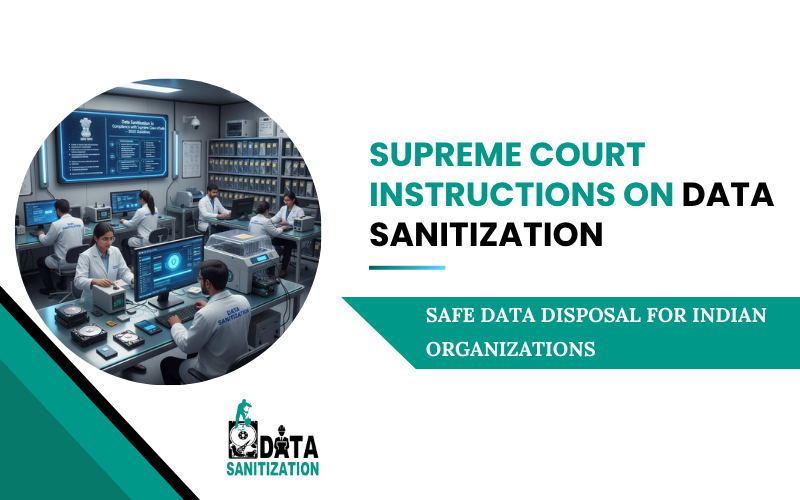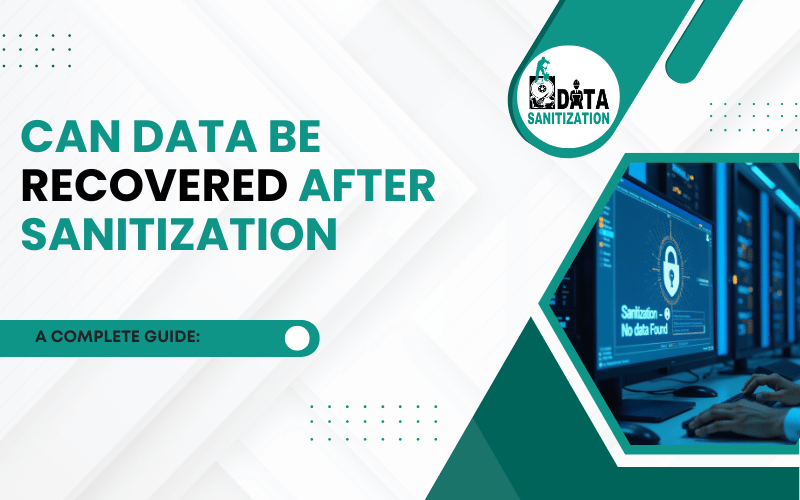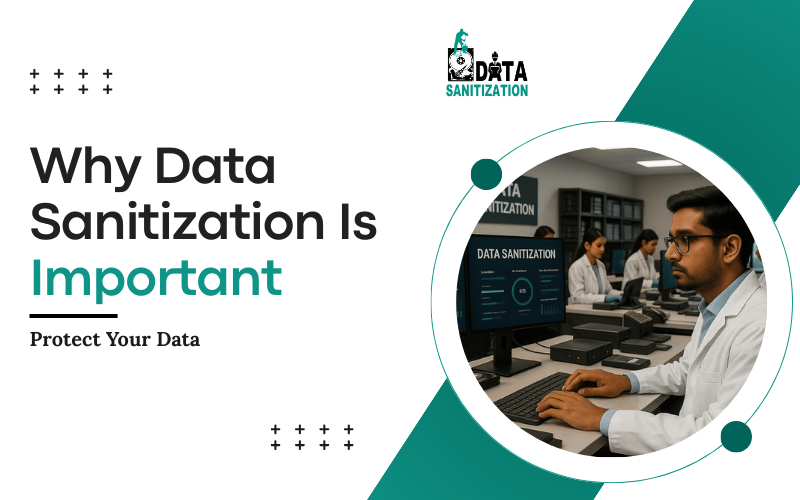In the digital age, data is an invaluable asset — but with it comes a critical responsibility to protect sensitive information from unauthorized access, breaches, and misuse. The Supreme Court of India has reinforced this responsibility through clear instructions and guidelines on data sanitization and safe data disposal. Indian organizations must adopt certified, secure data erasure methods to comply with legal mandates and uphold the fundamental right to privacy.

This comprehensive blog dives deep into the Supreme Court’s directives, explores the significance of secure data sanitization, and outlines how Indian enterprises can ensure full compliance in 2025 and beyond.
⚖️ Why Data Sanitization is Critical: Insights from the Supreme Court
The Supreme Court’s landmark verdict on the Right to Privacy (Justice K.S. Puttaswamy vs Union of India, 2017) recognized privacy as a constitutional right, making it imperative for businesses and government bodies to safeguard personal data rigorously.
To honor these privacy rights, organizations must:
🗸 Implement permanent, irreversible data sanitization procedures that leave no trace of sensitive information.
🗸 Follow robust protocols for safe data disposal of physical and electronic media, including HDDs, SSDs, mobile devices, RAID systems, pen drives, memory cards, and IoT devices.
🗸 Prevent data recovery attempts that could lead to breaches or misuse.
📝 Supreme Court’s Key Instructions on Data Sanitization & Safe Disposal

1. Mandated Complete Data Erasure
The court directs that data sanitization must be thorough and effective, using industry-accepted techniques such as multi-pass overwriting, degaussing, or physical destruction to eliminate all traces of data.
2. Comprehensive Data Lifecycle Policies
Organizations are expected to maintain strict governance over data collection, storage, usage, and destruction to ensure compliance with privacy laws and court guidelines.
3. Certified and Documented Sanitization
Data erasure must be certified with detailed documentation to facilitate audits, transparency, and accountability, particularly for sensitive government and corporate data.
4. Prevention of Data Recovery
Sanitization methods must ensure that data cannot be retrieved by forensic tools or cybercriminals, safeguarding against identity theft, fraud, and corporate espionage.
5. Alignment with Data Privacy Legislation
These instructions complement India’s IT Act, the upcoming Personal Data Protection Bill, and international standards such as GDPR, reinforcing the necessity of secure data erasure.
🛠️ Common Data Sanitization Techniques Following Supreme Court Guidelines

- Overwriting: Multiple passes of random or fixed pattern data overwrite the original information to make recovery impossible.
- Degaussing: Magnetic disruption for HDDs to obliterate data physically.
- Physical Destruction: Shredding, crushing, or incinerating storage media to ensure permanent data loss.
🔥 Handling Damage Media and Complex Storage Types
In addition to typical storage media, organizations face challenges with damaged or complex devices, including:
🔹 Physical damage, fire, water, or flood damage
🔹 Boot loop errors on Android and iPhone devices
🔹 Firmware corruption and weak heads on drives
🔹 Complex storage like RAID arrays, mobile devices, drones, IoT devices, CCTV footage
🔹 Chip-off, JTAG, ISP techniques for forensic recovery
🔹 Imaging challenges for secure erasure and recovery verification
Supreme Court guidelines imply that organizations must tailor sanitization strategies to address these scenarios effectively.
🤝 Partnering for Complete Data Security: Data Sanitization & Data Engineers

At Data Sanitization, we provide certified, comprehensive data erasure services across all types of storage media, ensuring compliance with Supreme Court mandates and India’s evolving privacy landscape.
But how can organizations be absolutely sure that sanitized data can never be recovered, even by the most sophisticated forensic techniques?
This is where our sister concern, Data Engineers, India’s leading data recovery and digital forensic experts, play a crucial role. Data Engineers specializes in professional recovery from severely damaged, corrupted, or complex devices and conducts forensic investigations that push the boundaries of data retrieval.
Together, we offer a full-circle assurance: after Data Sanitization’s secure erasure, Data Engineers rigorously tests the media to confirm that no data remnants are recoverable. This collaboration ensures your organization’s data disposal is genuinely secure, protecting privacy and meeting Supreme Court and regulatory expectations.
⚠️✅Why Indian Organizations Must Prioritize Certified Data Sanitization
Ignoring Supreme Court instructions on data sanitization can lead to:

❗ Legal repercussions under India’s data protection laws
❗ Severe financial penalties and operational risks
❗ Loss of stakeholder trust and reputational harm
Certified data sanitization safeguards sensitive data, upholds legal compliance, and fortifies organizational integrity against cyber threats.
🛡️📜 Conclusion
The Supreme Court’s clear instructions on data sanitization and safe data disposal are a vital pillar of India’s data privacy and security framework. Indian organizations must adopt certified, irreversible data erasure practices and partner with expert providers like Data Sanitization for secure disposal solutions.
For comprehensive support covering data sanitization, forensic validation, and expert data recovery, trust the proven partnership of Data Sanitization and Data Engineers — leaders in India’s data security ecosystem.
Protect your organization. Comply with the law. Secure your data.
Need Onsite Data Sanitization Services?
Do you want Data Sanitization Services to be provided at your location? No worries!! We got it covered. Our team members will be appointed to finish the job at your location after you book the appointment with us. Please feel free to contact us.




